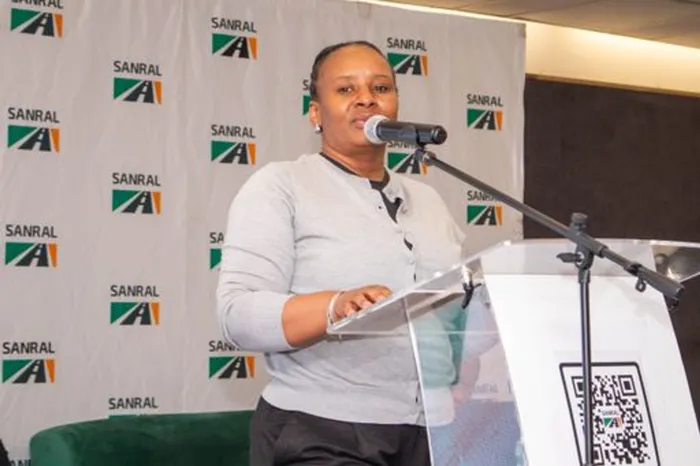Sanral launches programme to empower black-owned construction companies

Sanral’s chief corporate affairs officer, Lehlohonolo Memeza, at the launch of the agency’s Contractor Development Programme at the Mittah Seperepere Convention Centre in Kimberley. Picture: Supplied
IN A COMMITMENT to accelerate transformation within the construction industry, the South African National Roads Agency SOC Limited (Sanral) has launched its Contractor Development Programme (CDP) for black contractors with CIDB grades 5 to 9.
Sanral introduced the initiative to black contractors in the Northern Cape at an event held at the Mittah Seperepere Convention Centre in Kimberley on Friday .
The programme, which will be rolled out to support 100% black-owned construction companies across the country, aims to empower black contractors and to create a platform where they are given support to grow.
Sanral’s chief corporate affairs officer, Lehlohonolo Memeza, said the programme will shift the focus from traditional contractors and award tenders to black contractors, providing them with the necessary experience to compete against established firms.
“In order for black contractors to be able to participate fairly with the big contractors, we saw it necessary to create a platform where 100% black-owned companies are supported and given contracts, as well as the necessary support to be able to grow. The ultimate aim, and the developmental outcomes we envisage, is that these contractors grow a grade or two higher than when they entered the programme.
“The programme is tailor-made for the contractors within the CIDB grading 5 to 9. This initiative forms part of Sanral’s broader Horizon 2030 Strategy and Transformation Policy, which seeks to foster the growth of black industrialists across the construction value chain,” said Memeza.
He added that the programme will not only empower contractors, but also enhance their economic viability.
“The construction industry plays a vital role in shaping the socio-economic landscape
of South Africa, and Sanral is keenly aware of its potential to uplift communities
through job creation and business opportunities. If an infrastructure does not have pillars, it will collapse. We have seen that we cannot operate if we do not make transformation our centre and stronghold, so it has been elevated to a pillar, and this Contractor Development Programme accompanies it.
“The end goal and the developmental outcomes we envisage is that these contractors grow a grade or two higher than when they entered the programme. The contractors should also in the end be able to graduate with at least an NQF 5 qualification and be able to compete with the big guys once they have completed the programme.”
Memeza said the type of projects available to contractors within the grading will establish the duration of the programme.
“When looking at the possible project types we will select, the project duration ranges between three to five years. We are looking at a maximum of five years and a minimum of three years. Some of the contractors will be fortunate to get two contracts within that five-year period which will assist them in their grading, exposure and the training they require.”
She added that Sanral will be hands-on in the management of the programme.
“In order for contractors, as well as this project, to succeed, there should be necessary support for the contractors. Sanral will take the responsibility of ensuring all measures are in place.
“We will appoint a training service provider who will provide the training, supervision and mentorship on this programme. The reason Sanral will manage it, is to ensure all these services are executed efficiently. We have in the past noticed with the Grade 1 to 4 contractors, whereby we delegated everything to the main contractor, that doing it in that manner was not working. We trusted the main contractor to accelerate transformation on our behalf, and it was not working because we cannot expect someone to empower a person who will be their competitor in future.
“We have taken those duties on ourselves. Contractors in the programme will be reporting directly to Sanral employees and not a main contractor.”
Memeza added that the number of programme participants will be dependent on the projects allocated to contractors.
“We need to identify projects from our programme that will be utilised to participate in the programme. The approved projects will determine how many contractors at the initial stage will be included in the programme. Depending on the success of the programme, we will go back to the board to request for the approval of more projects to be included in the programme, which will then result in an increase in the number of contractors that will be included in the programme.”
Memeza clarified that the programme is not intended to undermine or bankrupt other contractor businesses.
“We are creating a platform whereby we will set aside projects wherein black-owned contractor companies can participate and whereby they do not have to compete with well-established and white companies. We are not taking everything and giving it to those selected in the programme, but we do want to bring those who are still struggling to a place where they can also be established and profitable in this industry. The pie is big enough for everyone.
“We are also not discriminating or locking out the white-owned companies, there are still lots of projects within Sanral whereby everyone can respond and benefit from.The focus is to rectify the injustices in the industry and to empower those who are in need of empowerment,” she said.